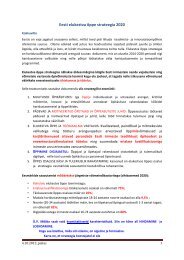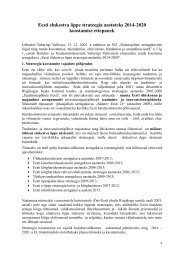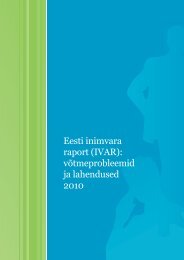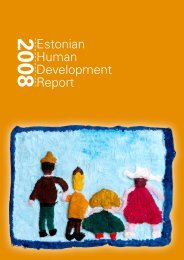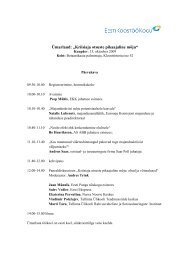DEVELOPMENT
The pdf-version - Eesti Koostöö Kogu
The pdf-version - Eesti Koostöö Kogu
You also want an ePaper? Increase the reach of your titles
YUMPU automatically turns print PDFs into web optimized ePapers that Google loves.
of the state’s development are encountered in the Czech<br />
Republic, Slovenia, Hungary, Poland and Slovakia. Estonia’s<br />
public opinion, which, previously, differed significantly<br />
from that of Latvia and Lithuania, has now become<br />
quite similar, and public opinion, in Ireland, is similar to<br />
all three of them.<br />
If we compare this, to the answers to the same questions<br />
five years ago (2007), when the effects of the crisis<br />
were yet to be felt, we see that, at that time, the assessments<br />
of development were clearly optimistic. There were<br />
more supporters for the direction of development of the<br />
country, than there were doubters, in Finland, Denmark<br />
and Austria, as well as Estonia, Ireland and Slovakia. Of<br />
course, there are also exceptions like Hungary, were the<br />
assessments of the developmental path were low, for a<br />
long time; or Latvia, where, five years ago, the direction of<br />
development was assessed even more pessimistically, but<br />
now the percentage of optimists has increased slightly.<br />
Generally, it can be said that the crisis made the citizens<br />
of all the European Union states think about the possibility<br />
of alternative development models.<br />
However, the important question is whether<br />
the search for these alternatives takes place in a constructive<br />
democratic atmosphere, where workable<br />
solutions are being sought, or the crisis mentality has<br />
deteriorated the belief in democracy, and this leads,<br />
not to new solutions, but to conflicts, which make it<br />
increasingly difficult to find solutions, and threaten the<br />
stability of the entire society.<br />
2.8.4<br />
Summary<br />
In conclusion, it can be said that trust in a state and its<br />
institutions is an important indicator, which expresses<br />
not only the reaction of the public to the events and<br />
scandals occurring in the state, but also reveals the public’s<br />
more general attitude toward democracy, and their<br />
satisfaction with the general direction of development<br />
in the state. Trust in the state’s institutions is reflected,<br />
indirectly, in society’s cohesion, and its capability to<br />
cope with conflicts and crises, Therefore, a decline in<br />
trust can be seen as a dangerous symptom of the reduction<br />
in that society’s stability. In international comparisons,<br />
we see the following clear differentiation: on the<br />
one hand, are the Nordic countries and some other old<br />
democracies, where trust in the government and political<br />
parties, and the general assessment of the functioning<br />
of democracy, has quite definitely endured the crisis;<br />
and on the other hand, are the countries, primarily in<br />
Central and Southern Europe, where the trustworthiness<br />
of the political system has suffered a serious decline as<br />
a result of the crisis, and therefore, the stability of the<br />
society has fallen into crisis. The fragility of the trust<br />
capital of young democracies is demonstrated by the<br />
Figure 2.8.7<br />
Assessment of the direction of development in Estonia<br />
and the reference countries, 2007 and 2012<br />
Development progressing in the right direction:<br />
2007 2012<br />
Development progressing in the wrong direction:<br />
2007 2012<br />
Percentage 0 10 20 30 40 50 60 70 80 90<br />
Denmark<br />
Austria<br />
Finland<br />
Netherlands<br />
Ireland<br />
Estonia<br />
Latvia<br />
Poland<br />
Lithuania<br />
Slovakia<br />
Hungary<br />
Slovenia<br />
Czech Republic<br />
Percentage 0 10 20 30 40 50 60 70 80 90<br />
Source: Eurobarometer 68 and 78<br />
trajectory of the former success stories of the Czech<br />
Republic and Slovenia, during and after the crisis, when<br />
trust in the government and political parties has been<br />
steadily declining, falling below 10% of the population.<br />
Compared to these countries, Estonia’s democratic<br />
institutions have maintained a relatively good reserve<br />
of political trust, although the decline, during the last<br />
few years, is also cause for concern in Estonia, and the<br />
assessment of the correctness of the country’s direction<br />
of development has decreased, more than twofold,<br />
within the last five years.<br />
References<br />
1. Public Opinion and National Defence poll – www.kmin.ee/et/<br />
avalik-arvamus<br />
2. Eurobarometer 68 – Eurobarometer 68: Autumn 2007.<br />
– ec.europa.eu/public_opinion/archives/eb/eb68/eb68_en.pdf<br />
3. Eurobarometer 78 – Standard Eurobarometer 78: Autumn 2012.<br />
– ec.europa.eu/public_opinion/archives/eb/eb78/eb78_first_en.pdf<br />
4. Lauristin, M., Vihalemm, P. (2011). “Satisfaction with the Outcomes<br />
of Baltic Transition in Spring 2011,” Estonian Human Development<br />
Report 2010/2011. Tallinn: Estonian Cooperation Assembly<br />
Estonian Human Development Report 2012/2013<br />
99



